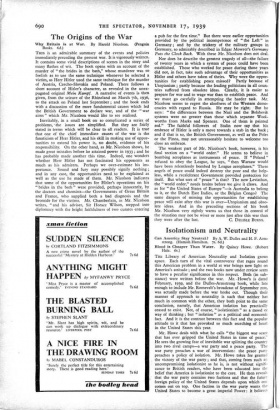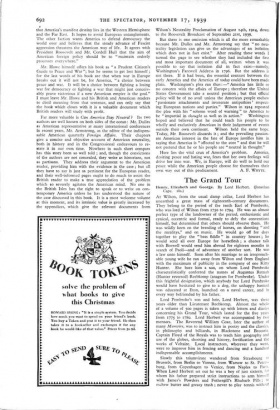Isolationism and Neutrality
Can America Stay Neutral ? By A. W. Dulles and H. F. Arm- strong. (Hamish Hamilton. 7s. 6d.)
THE Library of American Neutrality and Isolation grows apace. Each turn of the vital controversy that rages round this American problem in a world at war brings new light on America's attitude ; and the two books now under review seem to have a peculiar significance in this respect. Both (in sub- stance) were written before the war. Mr. -Howe's is dated February, 1939, and the Dulles-Armstrong book, while late enough to include Mr. Roosevelt's broadcast of September zrst, was actually made before the war broke out. Though their manner of approach to neutrality is such that neither has much in common with the other, they both point to the same conclusion, namely, that American isolation has practically ceased to exist. Not, of course, " isolationism " as a mood or way of thinking ; but " isolation " as a political and economic fact. And it is the contrast between this fact and the popular attitude to it that has provoked so much searching of heart in the United States this year.
Mr. Howe deals with what he calls " the biggest war scare that has ever gripped the United States in time of peace." He sees the growing fear of inevitable war splitting the country into two rival camps—a war party and a peace party. The war party preaches a war of intervention: the peace party preaches a policy of isolation. Mr. Howe takes for granted the victory of the war party ; and that, coming from such an uncompromising isolationist as he is, is not without signifi- cance to British readers, who have been educated into the belief that America is isolationist to the core. He then reveals that the war party contains two factions and that the future foreign policy of the United States depends upon which one comes out on top. One faction in the war party wants the United States to become a great -imperial Power : it believes
that America's manifest destiny lies in the Western Hemisphere and the Far East. It hopes to avoid European entanglements. The other faction wants America to defend democracy the world over and believes that the steady advance of Fascist aggression threatens the American way of life. It agrees with President Roosevelt and Mr. Cordell Hull that the aim of American foreign policy should be to " maintain orderly processes everywhere."
Mr. Howe himself offers his book as " a Prudent Citizen's Guide to Peace and War "; but he seems to get lost himself ; for the last words of his book are that when war in Europe breaks out it will not be, for America, " a choice between peace and war. It will be a choice between fighting a losing war for democracy or fighting a war that might just conceiv- ably prove victorious if a new American empire, is the goal." I must leave Mr. Howe and his British and American readers to distil meaning from that sentence, and can only say that the book which closes with it is a valuable document which British readers will study with profit.
Far more valuable is Can America Stay Neutral? Its two authors are well known on both sides of the ocean: Mr. Dulles as American representative at many international conferences in recent years, Mr. Armstrong, as the editor of the indispen- sable American quarterly Foreign Affairs. Their chapters give a concise and objective account of American neutrality, both in history and in the Congressional endeavours to re- state it in our own time. Nowhere in such short compass has this story been so well told ; and, though the convictions of the authors are not concealed, they write as historians, not as partisans. They address their argument to the American reader, providing him with the evidence in the case ; but all they have to say is just as pertinent for the European reader, and their well-informed pages ought to do much to assist the British reader to make a true appreciation of the problem which so severely agitates the American mind. No one in the British Isles has the right to speak or to write on con- temporary America unless he has understood the nature of the case discussed in this book. It is a most welcome volume at this moment, and its intrinsic value is greatly increased by the appendices, which give the relevant documents from Wilson's Neutrality Proclamation of August 14th, 1914, down to the Roosevelt Broadcast of September zxst, 1939.
But there is one omission which is all the more remarkable because Mr. Dulles and Mr. Armstrong say that " no neu- trality legislation can give us the advantages of an isolation which does not in fact exist." After reading these words I turned the page to see whether they had included the first and most important document of all, written- when it was possible to say that isolation did in fact exist—namely, Washington's Farewell Address in 1796. But the address is not there. If it had been, the essential contrast between the early America and the America of today could have been made plain. Washington's plea ran thus :—" America has little or no concern with the affairs of Europe ; therefore the United States Government take a neutral position ; but that official policy will be of no avail unless the American people eschew ' passionate attachments and inveterate antipathies' respect- ing European nations and parties." Wilson in 1914 repeated the plea with his " solemn word of warning " to America to be " impartial in thought as well as in action." Washington hoped and believed that he could teach his people to be wholly and exclusively American in their judgement of events outside their own continent. Wilson held the same hope. Today, Mr. Roosevelt discards it ; and the prevailing passion- ate American interest in the fate of Europe justifies him in saying that America is " affected to the core " and that he will not pretend that he or his people are " neutral in thought."
Here lies the vital crux of America's problem. America, desiring peace and hating war, fears that her own feelings will drive her into war. We, in Europe, will do well to hold our peace while the American people choose for themselves their
own way out of this predicament. A. F. WHYTE.





































































 Previous page
Previous page